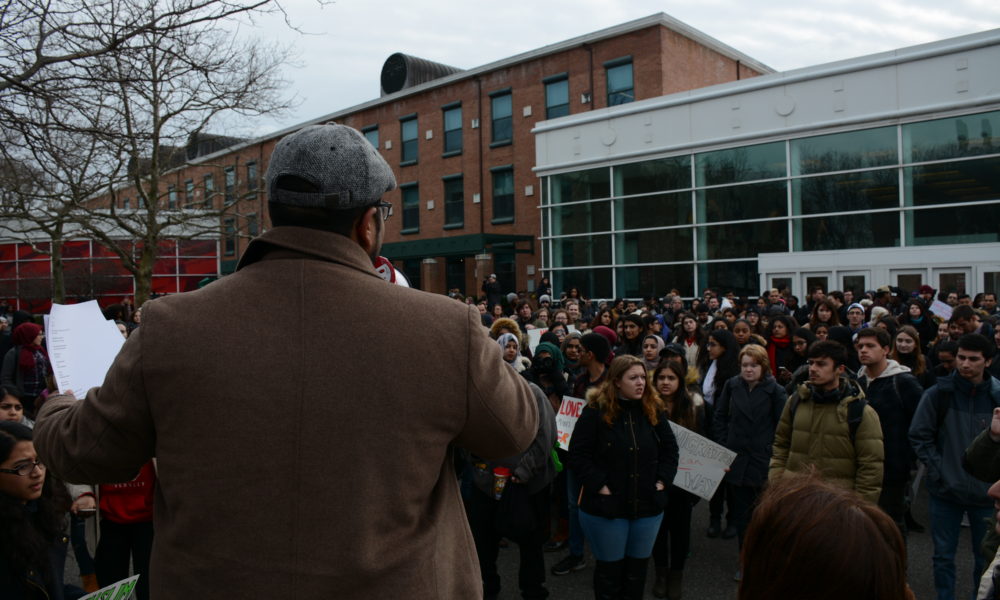Current POTUS Donald J. Trump has recently unveiled an immigration ban on seven Muslim-majority nations – Iraq, Syria, Iran, Sudan, Libya, Somalia and Yemen. Trump’s administration chose these nations because all seven countries are plagued with links to terrorism. The media failed to highlight the double standards in which the anti-American sentiment stems from a common grievance – All seven countries suffered from American intervention.
For example, the United States invaded Iraq under the suspicions of alleged Weapons of Mass Destruction, which were never found, and liberating the Iraqi people after years of crippling sanctions. After the fall of the Saddam Hussein regime, the nation failed to maintain its stability. Today, the nation suffers from immense sectarian strife as Sunni/Shi’a militias clash with each other, and militant insurgencies such as Daesh(Arabic for Islamic State) and the al-Quds Force exploit sectarianism in order to maintain their sovereignty in war-torn Iraq. Today, Iraq is considered the world capital of terrorism. Despite Saddam Hussein’s brutal authoritarianism, Iraq’s civil war exists from American intervention in overthrowing the regime, and the American government responds to this by banning Iraqis who are fleeing the country the United States invaded.
While the United States did not invade Syria, the Obama administration and its allies (i.e, gulf nations like Qatar and UAE) funded what they considered moderate rebels against the despotic Assad regime. The Assad regime showed no interest in preserving ties with the United States, instead turning to Russia in order to assist in Assad’s desire to maintain control over the region through military support. The United States especially has led bomb campaigns against insurgencies, but regardless of whether it is Russia or the U.S., both sides are responsible for civilian casualties and destruction in the region. Syrians are forced to endure in a war-torn country deprived of basic humanitarian aid. In fact, former U.S. Secretary of State John Kerry considers Syria to be the worst human catastrophe since WWII. In order to survive, they turn to the United States, a nation which contained a strong tradition of immigration, and in return, despite contributing to the catastrophe, the United States banned them from entering.
The United States neither invaded nor bombed Iran, but the CIA backed a coup electing an unpopular, Western-friendly monarchy known as the Shah. The monarchy’s ruthless authoritarian rule stirred rebellion, and this ultimately led to an election of a fundamentalist, anti-western theocratic state now known as the Islamic Republic of Iran. The U.S. government responded by introducing crippling economic sanctions on the nation, and the country consequentially suffered from “bringing inflation, food shortages and unemployment.” Iranian people would logically immigrate to the United States for better opportunity and to enjoy freedoms lacking in Iran, but despite the anti-Western fundamentalist state which was formed in response to an unpopular government backed by the CIA, the U.S. responds to this by banning Iranian people as well. The hypocrisy is beyond comprehension.

Sudan’s tension with the United States can be traced back to the Clinton Administration, in which sanctions were administered for political leverage and to prevent Islamist support in the region. However, according to doctors in Khartoum, sanctions have been proven to affect food, medicine and humanitarian aid in the region because they isolated the country’s healthcare provision. The most controversial American intervention involved the Tomahawk cruise missile attack of the al-Shifa pharmaceutical plant, which produced 90 percent of the country’s pharmaceuticals, under the suspicion of Islamist production of nerve gas. In addition to crippling sanctions prohibiting the nation from importing medicine, tens of thousands of Sudanese people, including children, have suffered from treatable diseases like malaria and Tuberculosis. The United States also aided in the production of a separatist state, now a recognized nation called South Sudan, which has tarnished relations with Sudan even further. But like the United States’ previous failures to account for regime change, South Sudan has erupted in civil war, a nation intended to serve as a safe haven for refugees in Sudan. In a nation crippled from economic disparity and civil war, Sudanese people fled to the United States for a better life, and the United States, the nation which contributed to the chaos of the region, responds by denying entry.
The intervention in Libya is similar to the situation in Iraq. The Hussein regime ruthlessly persecuted the Shi’a in Iraq, while the Gaddafi regime persecuted dissidents in the region. Initially, U.S.-led NATO intervened in order to protect civilians in Benghazi, but this would ultimately shift to toppling Muammar al-Gaddafi. Like Iraq, consideration for post-regime transition was not taken account, and Libya drastically shifted from a nationalized oil-rich nation to an anarchist state plagued by various infringement groups under the exploitation by insurgencies like ISIS. With little stability left in the region, Libyans have resorted to human trafficking in order to make ends meet, and today, thousands of migrants from Africa and the Middle East travel to Libya as a departure trafficking hub hoping to reach the shores of Europe. Libya used to be the richest nation and have the highest life expectancy in the continent shifted to an anarchist wasteland, and with nothing left Libyans apply to the land of opportunity for a better life only to be denied by the United States despite its leading role in destabilizing the region.
Somalia has been one of the many battlefronts suffering under the American military drone program. However, American intervention can be traced to earlier in which Somalia used to be under socialist, authoritarian rule under Mohammed Siad Barre. After Barre was overthrown, the country plunged into civil war and the nation failed to establish a centralized, stable government. Warlords have struggled to maintain control, and a loosely-connected band of Islamists known as the Union of Islamic Courts (UIC) posed a serious problem to the United States for its alleged ties to al-Qaeda. Under American support, neighboring Ethiopia invaded Somalia, but a released WikiLeaks cable suggested Ethiopia had no intention in invading. In fact, the Bush administration had pressured Ethiopia to do so, especially from its previous failures of invading Iraq and Afghanistan, and continued to propagate fear of a possible terrorist invasion of Ethiopia. Ethiopia’s invasion was meant to contribute to a centralized government, and to allow humanitarian aid in the region because the United Nations had little success in importing supplies to hostile warlords in power. Post-invasion however, over 13 installed governments have failed to keep control over the region plagued under civil war from extremist factions such as al-Shabaab. In fact, humanitarian aid has failed tremendously as António Guterres, the U.N. High Commissioner for Refugees, considered Somalia the worst humanitarian disaster in the world. In a nation plagued under civil war, drought and starvation, Somalis resort to the United States, the nation which failed to address the humanitarian problem. Somalia’s condition post-invasion has been so horrible that John Holmes, a former British diplomat and UN’s emergency humanitarian coordinator, described it as worse than Darfur, a place which witnessed one of the worst genocides of the 21st century. The United States acknowledges the situation by increasing drone warfare in the region and closing their doors to Somalis in desperate need.
The Intervention in Yemen consisted of a proxy-war. Western-friendly and Saudi-backed President Abdullah Ali Saleh agreed to step down after protests erupted demanding his resignation in response to the protests in Tunisia, the spark of the Arab Spring. Yemen led elections for a provisional government, and Abdu Rabbu Mansour Hadi was inaugurated. The Houthis, a Shi’a rebel group suspected of receiving weapons and funding from Iran, seized control of the region in anger over Hadi’s sympathy towards Saudi Arabia. Saudi Arabia was concerned with ensuring a secure partner south of borders, while Yemenis felt decades of Saudi influence has not reflected in favor of its people. Saudi Arabia retaliated by engaging in military strikes involving, on average, 13 casualties a day, including the tragic attack on a funeral leaving at least 100 dead and 500 injured. The United States supplies its weapons to Saudi Arabia, and despite pressures from the international community for the recklessness in the attacks, the United States, under the Obama administration, has pledged to continue its unconditional support for the Kingdom’s policy. The Yemenis are left in everlasting civil war, and basic supplies for humanitarian aid are inaccessible resulting in a spike in malnutrition. With little representation or opportunity left in the region, Yemenis turn to the United States, the nation responsible for financing Saudi Arabia’s indiscriminate killings, and yet the United States has chosen to blacklist them from entering.

It is evident that the United States has played a significant role in the instability of these countries, yet ignorant people wonder why certain parts of the world hold the United States in contempt. Instead of delegitimizing these sentiments as “They hate us for our freedoms” or “They can’t fix their own problems,” perhaps they should pay more attention to the conditions these people live in and the American government’s role in the instability of their nations. The media not only fails to acknowledge this, but also does not rationally examine the banning of immigration. The United States is a country embedded in immigration tradition. Before the creation of the nation, the first European settlers were immigrants, political and religious refugees and economically disadvantaged individuals all seeking a better life.
Defenders of the immigration ban rally behind the motion out of fear of alleged terrorist sympathizers infiltrating the nation. Ironically, this is not the first reaction to immigration and most certainly not the last. During the persecution and eventual extermination of Jews in Nazi Germany, the United States turned away a boatload of 935 Jewish refugees aboard the St. Louis, over fears of Nazi infiltration into the nation. These refugees were sent to different parts of Europe, and with the exception of those who entered England, were killed as Nazi Germany took over the rest of Europe. History gets even worse – the Wagner-Rogers bill was introduced in order to admit 20,000 German Jewish children into the U.S. The American public had an unfavorable view of Jewish immigration (2:1 against) and the bill ultimately failed to pass. It is not surprising to see today, over one thousand rabbis have signed a letter to welcome refugees into the US, because indeed the U.S. has made the mistake in the past not to.
Even if for any convincing reason a definitive immigration ban should be put into place, I wonder why these nations were chosen. I wonder why it is not Saudi Arabia, the nation where 15 of the 19 9/11 hijackers were from, the United Arab Emirates, one of the gulf nations involved in backing Sunni fundamentalist rebel groups in Syria or Egypt/Lebanon, countries considered dangerous to travel under the U.S. Department of State for insurgent sympathizers in the regions. Americans have died from terrorists from these countries; in fact, the 9/11 hijackers were from all four of these countries, yet Trump’s administration ignored them. Is it because Saudi Arabia plays a significant role in oil and military deals with the United States? Or because Saudi Arabia, UAE and Egypt all have businesses belonging to Trump? Maybe Lebanon was not chosen because a member in his cabinet, Walid Phares, had ties with a ruthless Christian Lebanese militia which conducted the brutal slaughtering of Arabs in the Sabra and Shatila Massacre. Regardless of what the reason may be, I personally am against an immigration ban in general. Refugees experience the most rigorous screening than anyone else entering the US. If there truly is a compelling reason to do so, the immigration ban on countries other than the four nations is ridiculous. More importantly, an immigration ban on nations dismantled by the United States is incredibly irrational.
The Trump Administration and its supporters do not speak for all. Protests have erupted against the ban, e.g, protesters in New York, Dallas, Boston, etc. demanding release of refugees held in custody. The American Govt. should anticipate strong resistance from the American People, because it is tribulations like these which validate the morality and ethics of those who fear tyranny, fascism and corruption in a country which gives a new start to all, the United States.




Comments are closed.